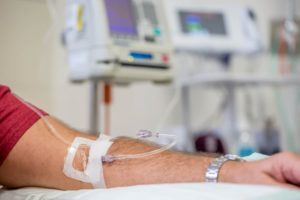
Cancers Most Likely To Benefit From Targeted Monoclonal Immunotherapy
One of the most effective ways to treat cancer is to harness the power of the body’s own immune system. This method is called immunotherapy.
HIPAA Alert: Potential Data Breach Learn More
Questions on Oncology, Hematology and/or Infusion Clinical Services due to COVID-19 Crisis – CALL 833-698-1623
Important Information for Our Patients Regarding the Coronavirus.
RCCA Providing Area Cancer Patients with Access to Care During Coronavirus Outbreak
RCCA Offering Patients Virtual Visits During Coronavirus Pandemic
Leukemia diagnoses are rising in northern New Jersey even as they fall nationwide, with Sussex and Morris counties outpacing the statewide average. Board-certified hematologist and medical oncologist Jamie Koprivnikar, MD, recently examined the data, discussed potential contributing factors, and told how she and her colleagues at Regional Cancer Care Associates (RCCA) – one of the nation’s largest networks of cancer specialists – make use of the latest therapies to treat leukemia, a cancer of the blood and bone marrow.
Citing statistics from the National Cancer Institute (NCI), Dr. Koprivnikar notes that the nationwide rate of new leukemia cases from 2014 to 2018 was 14.2 per 100,000 people per year. The NCI reports that cases nationwide have been falling by about 2.5% annually in recent years. By contrast, the rate in New Jersey during the 2014-2018 period was 15.9 cases per 100,000 people per year, with that rate rising by about 0.9% annually, according to the NCI.
Meanwhile, NCI statistics show that the rate in Sussex County was well above national and state averages, at 19.6 per 100,000 per year, with Morris County also exceeding the Garden State standard at 17.0 cases per 100,000 per year. (See table below for details on all northern New Jersey counties.)

Dr. Koprivnikar says that while it is not possible to identify the precise impact that various known and suspected risk factors for leukemia – such as smoking, chemical exposure, past chemotherapy or radiation treatment, and advancing age – have on the incidence of the disease in any one county or even state, demographics likely play a role in New Jersey’s upward trend.
“The incidence of many forms of leukemia increases with age, and the aging of the ‘Baby Boomers’ is one obvious explanation,” says the physician, who practices in Hackensack at the John Theurer Cancer Center of Hackensack Meridian Health system’s Hackensack University Medical Center.
For older patients who have survived a previous cancer, the radiation or chemotherapy they received also increases their risk for leukemia, Dr, Koprivnikar says. Both treatments can change cellular DNA and cause cells to multiply abnormally. “As we see gains in survival in solid tumor cancers, patients may be living long enough to develop later-term side effects, such as a treatment-related acute myeloid leukemia,” she explains.
Along with age, ethnicity plays a role in determining relative risk for the various forms of leukemia, Dr. Koprivnikar adds. She notes that chronic lymphocytic leukemia (CLL) is most often seen among older persons, particularly in Caucasian men ages 65 to 74 years, while being fairly uncommon among Asians. Caucasian men ages 70 and older are at increased risk for acute lymphocytic leukemia (ALL), relative to other demographic groups, while acute myeloid leukemia (AML) is most prevalent among Hispanics, she notes.
While the rate of leukemia diagnoses may be increasing in northern New Jersey, fewer area residents are dying of the disease compared to just a few years earlier. Across New Jersey, the death rate fell by an average 1.5% each year from 2015 to 2019, ranging from an average annual decline of 7.8% in Union County to an unchanged rate in Sussex County, according to the National Cancer Institute.
Dr. Koprivnikar attributes that progress to a dramatic expansion in the number of treatment options available to people with leukemia, and the ability this provides their physicians to develop highly individualized treatment plans. “The last 10 years have seen at least 20 new drugs approved across the various forms of leukemia,” she says. “Rather than any single agent revolutionizing the field, matching the right drug with the right patient based on disease-specific characteristics has created the biggest impact.”
The development of immunotherapies that prompt the body’s immune system to attack cancerous cells and medications that target specific genetic changes or mutations that drive leukemia both have improved outcomes, Dr. Koprivnikar explains.
The National Cancer Institute reports that 5-year survival rate for all forms of leukemia was 65% in 2011-2017, the last period for which complete data are available. This means that roughly two-thirds of people with the disease will be alive for at least five years after their diagnosis. That survival rate is double the 33% rate in 1975. However, the Leukemia & Lymphoma Society notes that the 5-year survival rate varies considerably by type of leukemia, standing at 88.6% for CLL, and at roughly 72% for ALL and chronic myeloid leukemia (CLL), but at 29.8% for AML.
As with all forms of cancer, early detection of leukemia can help improve outcomes by enabling prompt initiation of treatment. Dr. Koprivnikar urges people to see their primary care physician if they are experiencing one or more of the following symptoms, which may be warning signs of leukemia:
The cancer specialist notes that the symptoms listed above may indicate the presence of any number of conditions, not just leukemia. While experiencing one or more of those symptoms is not a cause to panic, it is a reason to see a primary care provider without delay, she adds.
With a practice and research focus on hematologic malignancies, Dr. Koprivnikar collaborates closely with her RCCA colleagues at the oncology network’s 18 care centers across New Jersey. “We share in the care of leukemia patients,” Dr. Koprivnikar explains. “While patients may come to us at the John Theurer Cancer Center for induction therapy or clinical trials, we work with our RCCA colleagues in community-based offices to provide seamless care with regard to blood count checks, transfusion support, and other therapy.” Through such collaborative efforts, she adds, RCCA patients have ready access to the full range of treatment regimens, including bone marrow transplantation and cellular therapy, and to investigational therapies being evaluated in clinical trials.
*******
Dr. Koprivnikar received her medical degree from the Sidney Kimmel Medical College, formerly Jefferson Medical College of Thomas Jefferson University, in Philadelphia, PA. She completed her internal medicine residency at MedStar Georgetown University Medical Center in Washington, DC. She then completed a fellowship in hematology and oncology, also at MedStar Georgetown University Medical Center. She was chosen to serve as chief fellow during her third and final year of fellowship.
The hematologist and medical oncologist spent the early part of her career on faculty at MedStar Georgetown University Medical Center, where she was active in teaching medical students, residents, and fellows. She also served as the medical co-director of the Patient Blood Management Program and was active on the institutional review board and as an investigator on many clinical trials. She is a member of the American Society of Hematology.
Dr. Koprivnikar is one of 80+ cancer specialists who treat patients at more than 20 RCCA care centers in New Jersey, Connecticut, Maryland, and the Washington, DC, area. Those oncologists see more than 22,000 new patients each year and provide care to more than 225,000 established patients, collaborating closely with their patients’ other physicians. They offer patients the latest in cutting-edge treatments, including immunotherapies and targeted therapy, as well as access to a wide range of clinical trials. In addition to serving patients who have solid tumors, blood-based cancers, and benign blood disorders such as anemia, RCCA care centers also provide infusion services to people with many non-oncologic conditions including multiple sclerosis, Crohn’s disease, asthma, and rheumatoid arthritis who take intravenously-administered medications.
To learn more about RCCA, call 1-844-346-7222 or visit RCCA.com.
| Location | Age-adjusted incidence per 100,000 | Average annual number of new diagnoses | Recent 5-year trend in annual incidence rates (2014-2018) |
| United States | 14.2 | 51,953 | -2.5% |
| New Jersey | 15.9 | 1,651 | +0.9% |
| Bergen County | 15.9 | 185 | +1.3% |
| Essex County | 14.8 | 124 | +0.8% |
| Hudson County | 11.7 | 75 | +0.2% |
| Morris County | 17.0 | 104 | +1.3% |
| Passaic County | 15.0 | 81 | +0.7% |
| Union County | 15.5 | 94 | +0.9% |
| Sussex County | 19.6 | 33 | +3.0% |
| Warren County | 15.6 | 21 | +0.4% |
For more information or to schedule an appointment, call 844-346-7222. You can also schedule an appointment by calling the RCCA location nearest you.

One of the most effective ways to treat cancer is to harness the power of the body’s own immune system. This method is called immunotherapy.

Hematologic cancer, or blood cancer, is one of the most common diagnoses treated at Regional Cancer Care Associates. Blood cancer refers to types like leukemia

If you or a loved one has been diagnosed with cancer, doctors can choose from many treatments to provide the best care possible for each

Regional Cancer Care Associates is one of fewer than 200 medical practices in the country selected to participate in the Oncology Care Model (OCM); a recent Medicare initiative aimed at improving care coordination and access to and quality of care for Medicare beneficiaries undergoing chemotherapy treatment.